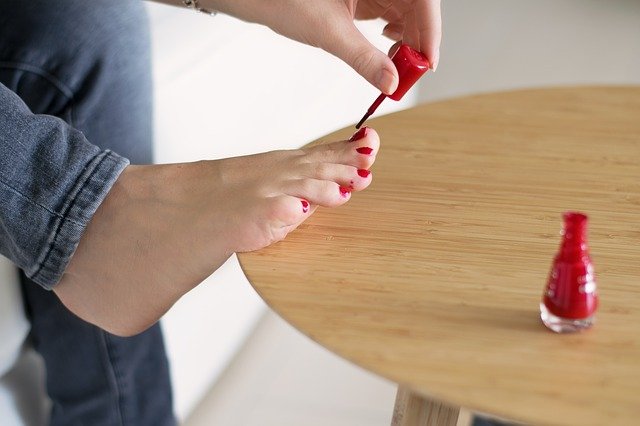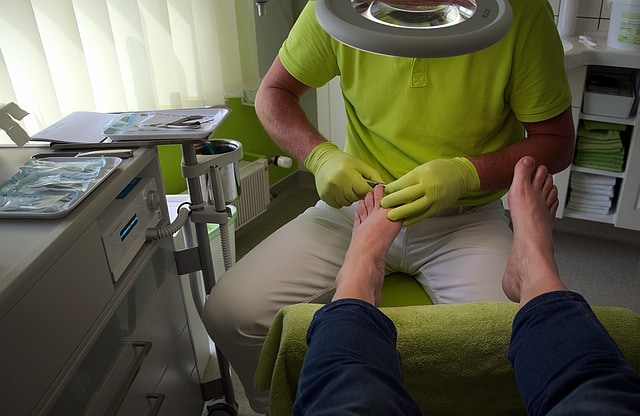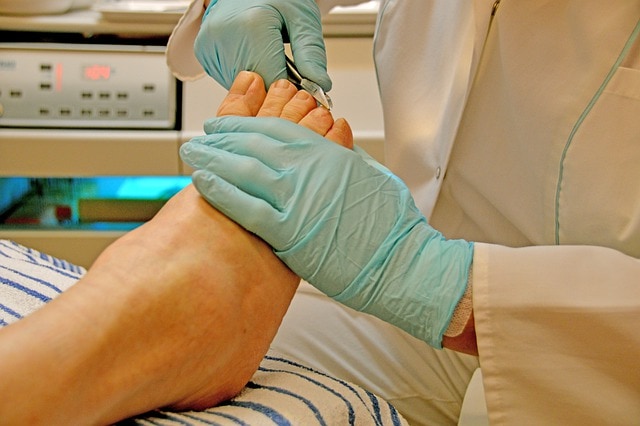The thought of surgery is upsetting or even frightening, for both the patient and their loved ones. This is natural and feeling anxious is only to be expected. However, there’s nothing to worry about.

What is nail podiatric surgery?
Of all podiatric surgeries, nail surgery is the most common type. It is usually related to ingrown toenails, but could also be performed for other complaints like fungal infections in the nail beds or for accidents that have damaged the toenails.
What is an ingrown toenail?
An ingrown toenail grows into the flesh of the toe, instead of remaining within the confines of the nail bed. The nail presses into the flesh, causing inflammation, infection and pus formation, which can become very painful.
Ingrown toenails are often caused by:
- Poor nail-cutting technique
- Naturally/genetically defective or curved nail shape
- Footwear that is too tight
- Sports or activities that involve major force or repeated blows to your feet: like kickboxing or football
- An improperly trained pedicure professional

Treating ingrown nails at home without podiatric surgeries
Ingrown toenails that are mildly painful can be treated at home. Here’s what you can do:
- Soak your feet in warm water a few times a day
- Once your nails are softened, use a cotton swab soaked in antiseptic cream to push the nail away from the flesh and back into place
- Apply an antiseptic cream to the area to prevent bacteria from settling in
- Avoid wearing tight shoes or boots that press on your toenails
- Keep your feet clean and dry
- When clipping your toenails, cut in a straight line and don’t clip them too short
Podiatrists dread seeing botched bathroom podiatric surgeries or DIY treatments that patients have attempted on themselves because it makes it harder to treat the problem. Apart from possibly aggravating the infection or developing festering wounds, doing your own podiatric surgeries at home can make it hard for the doctor to suggest post-op ingrown toenail care.

Should I be nervous about nail podiatric surgeries?
No, you shouldn’t. And here’s why.
- It’s a routine procedure: Nail surgery is one of the most common complaints that podiatrists treat. An average podiatrist will perform multiple procedures in a week.
- You don’t need general anaesthetic: For many people, the idea of being unconscious or sedated during surgery is upsetting. But nail surgery is performed under local anaesthetic, so you are conscious or awake during the surgery.
- You can go home the same day: Nail surgery is an outpatient surgery, which means you don’t need to stay in the hospital after it is over.
- Nail surgery is a permanent solution that will save you a lot of discomfort and potential complications in the future
Suddenly this seems a lot less intimidating, doesn’t it?
After all podiatric surgeries, you will be expected to follow some post-op ingrown toenail care procedures to help your feet heal better. Do adhere to the instructions about medication and mobility that your doctor advises.
When should you consider nail podiatric surgeries?
For ingrown toenail surgery, your podiatrist will start by trying to treat you with a combination of topical creams, changing your foot care habits, and maybe even anti-inflammatory medicines. However, if the condition becomes chronic or very painful, nail podiatric surgeries are a permanent solution.
For other complaints of the toenails, your doctor will recommend surgery for recurring conditions or if the infection has become more serious.
What to expect during nail pediatric surgeries?

If you have scheduled nail podiatric surgery, you should present with clean, unpolished toenails with no jewellery on your feet.
The procedure will take place in a sterile area or room. When you’re ready, a local anaesthetic will be administered to numb the area.
A simple toenail podiatry surgery procedure should take about 20-30 minutes, and the local anaesthetic should wear off in about 2 hours.
You will be able to walk immediately after your nail podiatric surgery, but you should avoid driving. Your toe will be numb for some time so ask someone to accompany you home. After your anaesthetic wears off, you may feel some pain. You may take some Paracetamol if needed, but you should take it easy for the rest of the day and follow all post-op ingrown toenail care measures.
Post-operative care for nail podiatric surgeries
Your podiatrist will discuss a post-op ingrown toenail care plan that is customized for you. The most common tips are:
- Apply an antiseptic cream and keep the area bandaged.
- Schedule a follow-up appointment in 7 days to review the site.
- Be careful not to get your foot wet when showering or using the washroom.
- Avoid working out, running, swimming, or walking fast
- Wear open-toe shoes or sandals during your recovery period
Once your foot has healed from toenail podiatric surgeries, you should be free from the pain and discomfort of ingrown toenails and can return to your regular schedule.
Which doctors are classified as podiatric surgeons?
Within the podiatry domain, podiatric surgeries are a special field with their standards and requirements. They involve surgical treatments of myriad conditions affecting ankles, feet and the lower extremities by experienced and trained podiatrists.

Your podiatrist is a surgeon who has undergone comprehensive post-grad training to enable them to perform surgeries on the ankle and the foot.
The average podiatric surgeon performs multiple surgeries and should be highly experienced when it comes to all biomechanical, functional and medical aspects related to the lower extremities.
The qualifications of all podiatric surgeons are recognized by the Australian State and Federal Governments. Podiatry surgery is classified as an approved specialty by the Australian Health Practitioners Regulation Agency. This makes all qualified surgeons eligible to be part of the Health Insurance Act as well as the National Health Act.
What other conditions can podiatric surgery treat?
Podiatric surgeons are uniquely qualified to diagnose and treat any conditions related to the ankle and the foot. This includes all concerns related to the bones and soft tissues of the lower extremities such as:
- Problems related to the skin and nails of the feet
- Fractures, post-traumatic arthritis, dislocations and other debilitating conditions
- Bone spurs
- Conditions affecting the tendons and soft tissues of the lower extremities
- Heel pain
- Flat feet, bunions, unusually high arched feet, hammertoes and all other structural deformities
- Entrapments of nerve fibres
- Congenital deformities
- Age-related wear and tear of lower joints which can lead to arthritis
Will my health fund cover podiatric surgeries?
Most podiatric professionals are likely to advise you of the costs you will incur before undergoing any treatment. In any case, you should discuss the same with your surgeon and always ask for a quote that covers all major costs.
After you receive any sort of quote from your surgeon, it is best to enquire with your health fund about all the benefits that you could avail of under your current plan. After doing this, you should have a fair idea of how much you’ll need to spend before undergoing the treatment.
Do count all costs related to anaesthesia and miscellaneous hospital expenses as these are not always fully covered by all plans.



